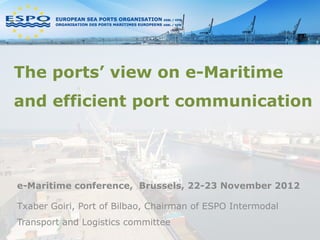2012 11-22 e-maritime espo txaber goiri
- 1. The portsŌĆÖ view on e-Maritime and efficient port communication e-Maritime conference, Brussels, 22-23 November 2012 Txaber Goiri, Port of Bilbao, Chairman of ESPO Intermodal Transport and Logistics committee
- 2. European Sea Ports Organisation Founded in 1993 Represents European seaport authorities Members from EU and neighbouring countries Secretariat in Brussels Recognised counterpart of EU institutions A lobby and a knowledge network
- 3. ESPO view on e-Maritime Stakeholder conference / Industry forum: ESPO welcomes the opportunity given to the industry to provide feedback on the ongoing initiatives and the way forward ESPO sees e-Maritime as an opportunity towards setting the requirements for an efficient system that would facilitate procedures and information exchange in port areas and the logistic chain
- 4. Implementation of Directive 2010/65/EC ESPO welcomes the progress achieved within the dedicated expert group on the implementation of the Directive regarding the definition of the national Single Windows - Flexibility to the Member States Existing Port Community Systems (PCS) need to be maintained and to be integrated within the national Single Windows.
- 5. Implementation of Directive 2010/65/EC There is a difference between information exchange for formalities purposes and information needed for operational purposes at ports Ports need to maintain flexibility and the right to ask for relevant additional information in order to effectively provide services to the ships while at port
- 6. Implementation of Directive 2010/65/EC Need to clarify the relation between the national single window development and the e-Customs initiative in order to avoid two co-existing single windows, one for vessels and one for cargo reporting. Better coordination with other initiatives (e-freight, e-navigation)
- 7. SafeSeaNet SSN has currently only limited value for ports that are mainly data providers within and do not always get access to data. SSN should be more proactive in terms of automatically disseminating information to ports related to arriving vessels If available and reliable, SSN provided information can complement data information exchange from existing port systems (e.g. Hazmat declarations)
- 8. SafeSeaNet Examples of data inaccuracies within SSN are often reported by ports having access to SSN data (e.g. Hazmat notification, differences between data provided by ship agents and SSN) Mis-declarations and responsibilities regarding the accuracy of data within SSN need to be addressed by EMSA
- 9. Additional comments The role of intermediaries needs to be maintained. Ship agents are the parties that are in direct contact with the port authorities and have a key role in ensuring reliability of ship data. IT solutions should be open and inexpensive to implement. Human resources and financial costs should not constitute limiting factors for smaller ports
- 10. Thank you for your attention! e-Maritime conference, Brussels, 22-23 November 2012 Txaber Goiri, Port of Bilbao, Chairman of ESPO Intermodal Transport and Logistics committee










